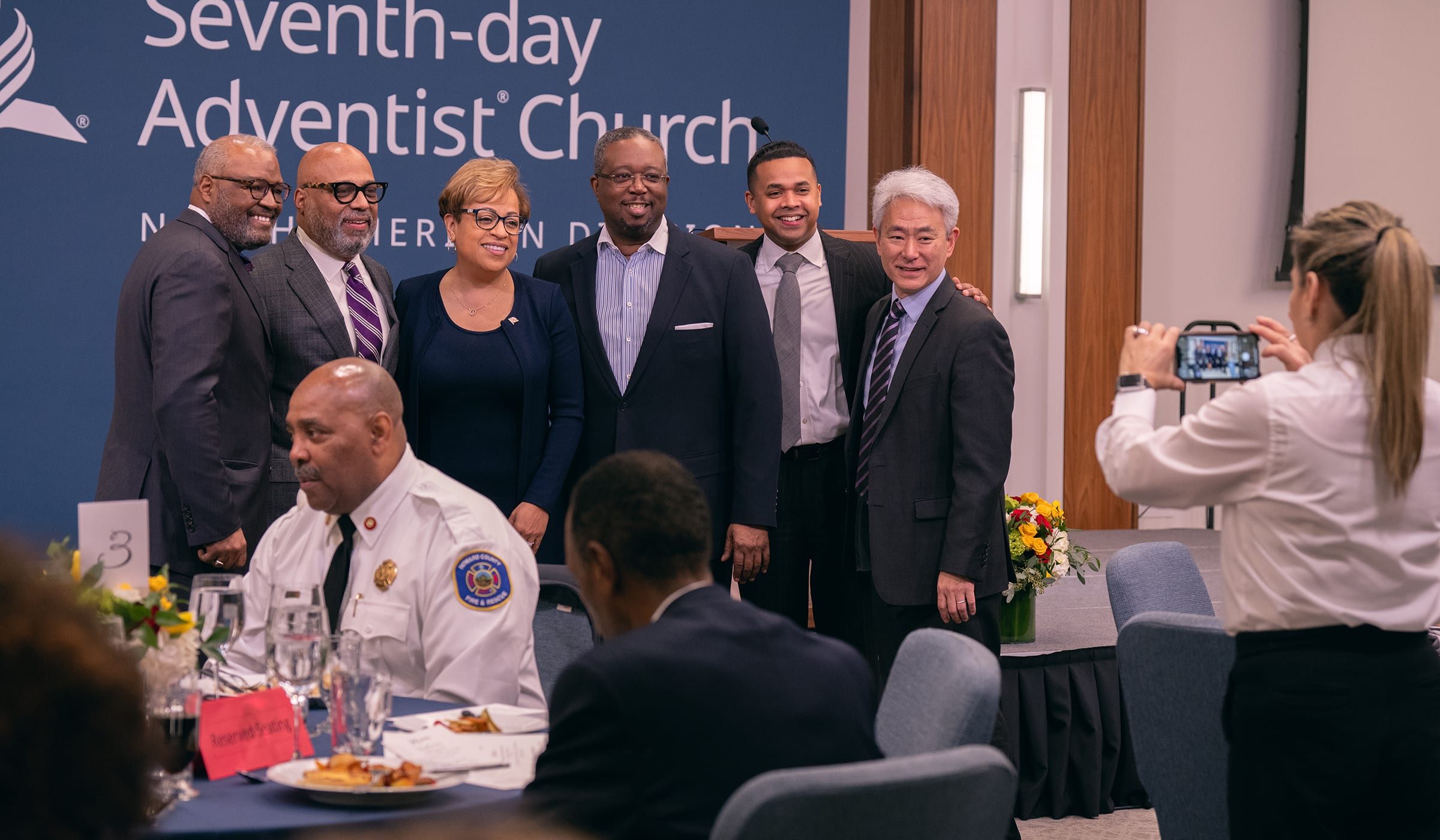
On January 18, about 110 local faith and civic leaders attended the fifth Religious Freedom Prayer Breakfast hosted by the North American Division (NAD) and organized by its Public Affairs and Religious Liberty (PARL) department at the regional church headquarters in Columbia, Maryland, United States.
The event commemorated Religious Freedom Day (January 16) and coincided with Martin Luther King Jr. Day (January 15). Attendees experienced a religious freedom–themed keynote address, special musical selections, and prayers focusing on religious freedom, peace, unity of spirit, and personal responsibility — all while savoring a catered meal.
Program participants and attendees represented 13 denominations, including the Church of Jesus Christ of Latter-Day Saints, Bahá'í, Judaism, Islam, Seventh-day Adventism, and other Christian denominations. Representatives from Maryland state and local county governments, as well as Washington Adventist University students, including PARL interns, also took part.
In his welcome, Orlan Johnson, NAD PARL director, shared shocking statistics: almost 80 percent of the world cannot “serve God [as] they see fit,” a phenomenon to which the United States is not immune. He also cautioned that a large percentage of self-proclaimed religious people learned their religion online or through AI rather than through traditional church attendance.
“That’s a reminder to us all … that we have to stay out on the front line and continue to fight,” he stated. Finally, Johnson stressed that in a world marked by growing discord, love and kindness among people of different faiths is paramount, which was a message enthusiastically embraced by the group.
Teresa Cochran, outreach coordinator for the Baltimore Coordinating Council, Church of Jesus Christ of Latter-Day Saints, has attended every NAD prayer breakfast to date. “I love [gathering] with other people of faith,” she said. “We may have different beliefs, different customs, but we can come together in support of each other and religious freedom.”
Her friend, Jenni Greenspan, a rabbi at a Conservative Judaism synagogue, concurred. “Any time we make space for camaraderie, talking to each other, being together, it’s a way to bring light to the world.”
Religious Freedom as a Call to Compassion
Walter Kim, president of the National Association of Evangelicals, delivered a thought-provoking keynote address, defining religious freedom beyond merely securing the right to worship or other religious rights. He described it more broadly as “labor[ing] for the common good, for the dignity of all created in God’s image while holding onto [their] own convictions of faith.”
His message was a call to compassion, inspired by the hospitality extended to him and his refugee family by Christians and church groups — an experience that led him to Jesus. Kim also shared a pivotal moment when, as a college freshman, he sat with other students of diverse spiritual perspectives, pondering life’s big questions, such as, “Who is God? What do you believe? What's different? What's the same?”
He reflected, “I walked away from that moment deeply formed, [recognizing] there are common concerns about the transcendent and what human life means.”
Kim asserted that religion is who we are, whether gathered in worship or scattered into “the various vocations of life we’re called into.” Referencing Martin Luther King Jr. and the Civil Rights movement, which was “deeply embedded in Scripture,” he stated, “Freedom of worship as we’re gathered and the freedom of conscience as we’re scattered … leads to a freedom of contribution, freedom to bring our whole selves to the table and to the concerns of our society.”
In concluding remarks, Kim said, “Thank you for the work you do in your various traditions. Thank you that we are coming to a place where we understand not just the least common denominator that would hold us together but the deepest common denominator that would drive us forward.” A standing ovation followed his conclusion.
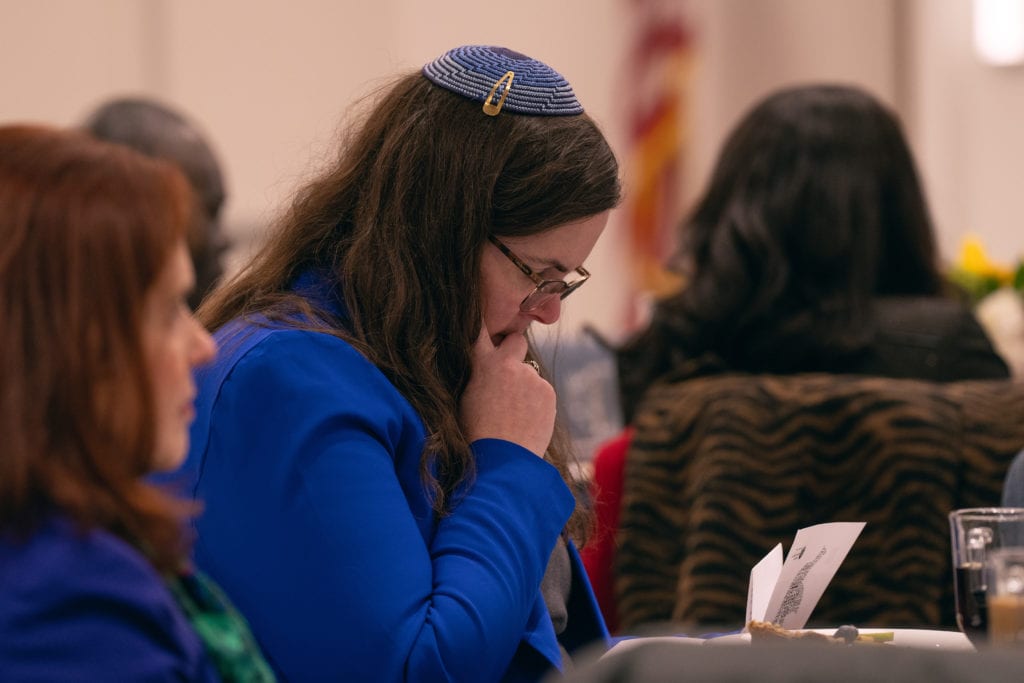
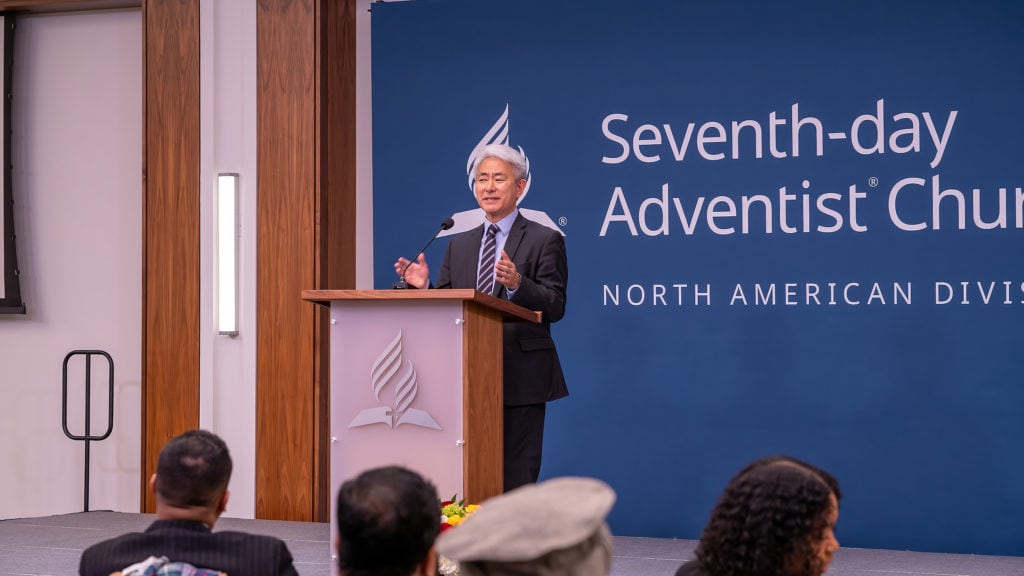
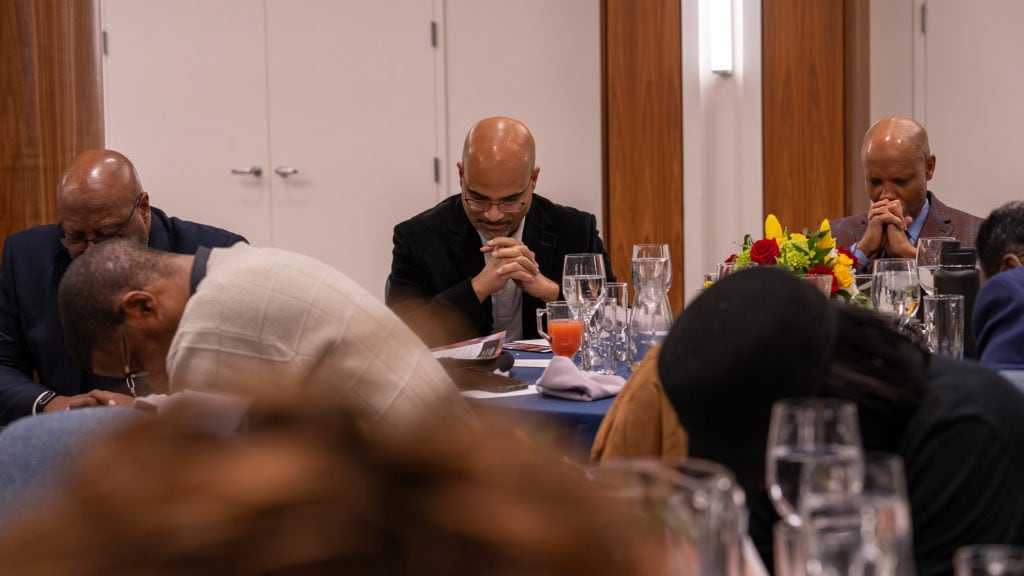
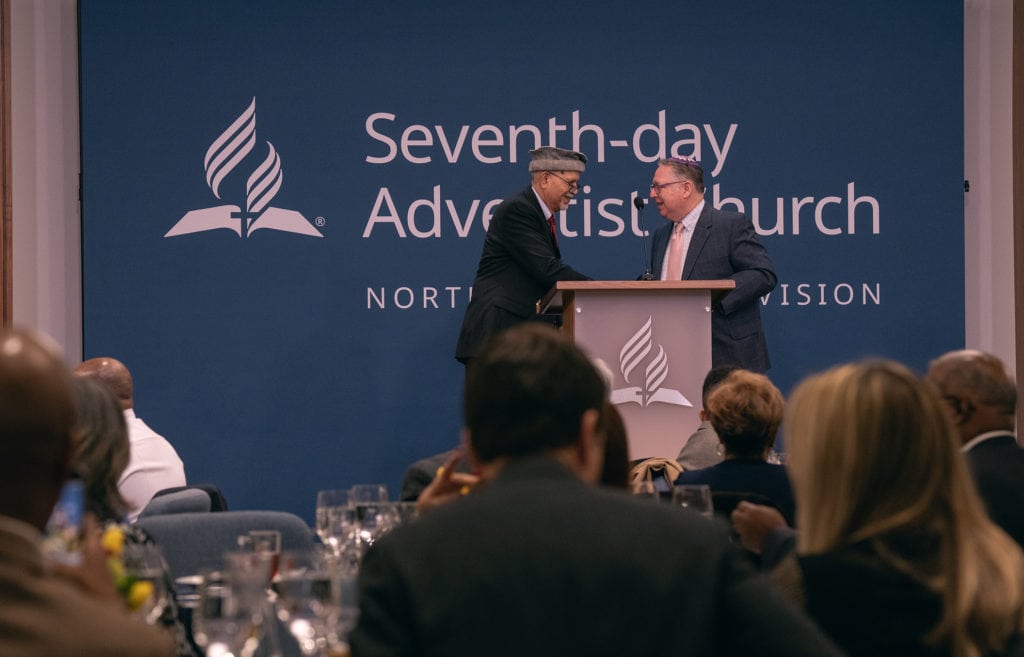
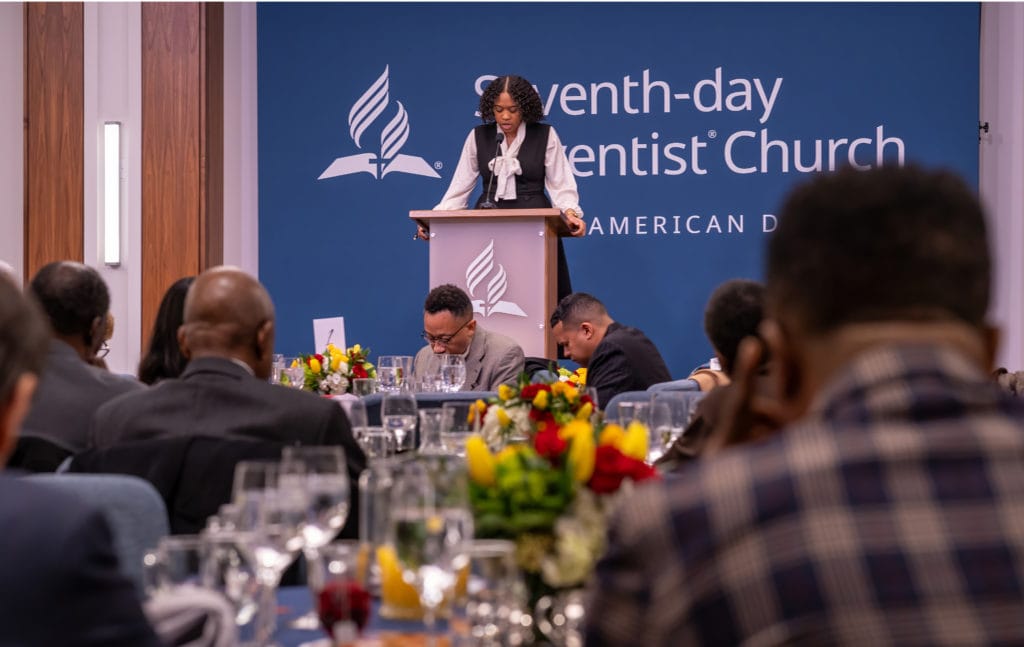
Season of Prayer
The highlight of the breakfast was the six themed prayers, starting with a prayer for elected officials by Stanley Carlson-Thies, senior director for the Institutional Religious Freedom Alliance. He asked God to restrain the power of government officials, armed forces, and private groups who might “suppress the exercise of religions they do not favor” and for citizens worldwide to be more committed to upholding the religious rights of others.
In her prayer for the community, Lora Hargrove, interfaith outreach director for the Maryland Governor’s Office of Community Initiatives, underscored that the commonality among different faith groups is the God they serve. Invoking Martin Luther King Jr.’s vision of a community “transformed and transfixed in and on God,” she petitioned God to empower attendees to embody His light, love, peace, and joy “in the vineyards to which [He sent] them.”
The vision of community depicted in Hargrove’s prayer resonated with many attendees, including Nelu Burcea, associate director for PARL with the General Conference of the Seventh-day Adventist Church. For Burcea, the event’s most valuable aspect was “the sense of community” and uniting “in a spirit of reflection and commitment to supporting religious freedom.”
Sheriff Marcus Harris and Colonel Mark Verderaime of the Howard County Sheriff’s Office echoed these sentiments, expressing appreciation for the friendship and camaraderie they experienced at the gathering.
NAD Adventist Chaplaincy Ministries director Washington Johnson II then prayed for God to grant wisdom and sound judgment to the nation’s leaders “as they navigate intricate decisions impacting the well-being of all Americans.” Additionally, he prayed for healing, restoration, peace, and security. Johnson then cast a vision, based on Isaiah 2:4 (KJV), of a time when “nation shall not lift up sword against nation; neither shall they learn war anymore.”
Allyson Chard, communication director for public affairs with the Church of Jesus Christ of Latter-day Saints, opened her prayer for elected officials on a celebratory note. “What a special week we’ve had! We commemorated Martin Luther King Jr. Day, and now we get to do this together.” She then prayed earnestly for these officials “to be men and women of strong moral fortitude.” Chard continued, “May they recognize and value the tapestry of different faiths, whose efforts weave together this country. May they feel the faith and prayers offered on their behalf in our churches, synagogues, mosques, and temples.”
A poignant moment occurred during a joint prayer between Craig Axler, rabbi for Temple Isaiah, and Amjad Chaudry, imam for Ahmadiyya Muslim Community. Addressing God as the “Holy One of blessing,” they prayed for strength to stand against evil, courage to combat hate, and the ability to heal our broken world. The prayer then took a hopeful tone. “Because there is hope, teach us to be [stewards of] justice and kindness,” Chaudry said. “Because there is love, help us to be a beacon of light and compassion,” Axler added.
Axler concluded, “And as it is written, be strong and let your heart have courage. Depart from evil, do good, seek peace, and pursue it.”
“Amen,” Chaudry said, and “Amen,” echoed among attendees. Then, the friends shook hands and took their seats at the same table.
Later, Johnson reflected, “The rabbi and the imam doing a prayer for peace together in the midst of some of the most turbulent times in the world, that stands out to me most.”
Before the concluding prayer, Johnson’s wife and, as he called her, “secret weapon,” Zina, moved the crowd to their feet while singing a transcendent Negro spiritual medley. Then, Claudia M. Allen, outreach and communications manager for the Howard County Office of Human Rights and Equity, offered a passionate prayer for unity.
Allen first sought God’s forgiveness for shortcomings, including, “placing our own interests above those [of the] marginalized, the disenfranchised, the oppressed.” She asked for divine intervention, that “in this most divisive time,” God might unify our hearts and minds to heal the land. “God use us to heal the land,” she implored. “Use us to heal our communities. Use us to heal our homes. Use us to heal our governments. Use us to heal our schools. Use us to heal our temples, our mosques, our synagogues, our churches. God use us to heal our world.”
She ended with a call to action. “Thank You for the ways that You will use each and every person in this room to be an agent of unity this year. We ask these things calling upon Your many names: Creator God, Elohim, Yahweh, Allah, Yeshua Hamashiach, Alpha and Omega, Jesus the Christ. Amen.”
The original version of this story was posted on the North American Division news site.